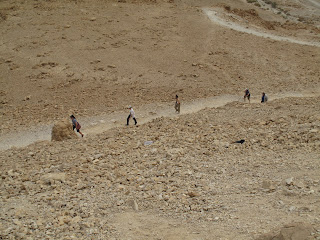
The mango is the national fruit of the Philippines. And not for nothing. I've had more mangoes since I've arrived in Salay than I've had in the last five years combined. And let me tell you something: I'm in LOVE. I may NEVER come back, because you can't get mangoes at home like the ones that grow in Loreta's backyard.
Paul and I were lucky enough to come to Salay (it's a tiny town, on the southern most island in the Philippines) in the middle of prime mango season. They ripen April through September, and the Rafisura's (who we're both documenting, and living with) have a bunch growing in their backyard. They pick them and let them ripen naturally, instead of using chemicals like lots of other people do.
I've been told the variety of mango we're enjoying is called the Caribou mango, the Tarabow mango, the Salay mango and the Manila mango, so take your pick. Whatever the official name, they're a little slice of heaven. Best enjoyed cold from the fridge, but almost as delicious warm, they not only taste like the most mango-y mango you've ever eaten, but the texture is almost like eating really thick pudding. In a good way. THEY ARE SO FUTZING GOOD.
So far today I've had 4, while Paul clocked in at 3 because he has the ridiculous notion that the sugar in them are keeping him up at night. Think he's going to wake up in the middle of the night in a cold sweat craving the mango that's waiting for him in the fridge.
That's how good they are. I think about them at night, when I'm eating one all I can think about is if I can have another one immediately after. They're ridiculously addicting. When you see someone else eating one, with the orange juice dripping down their chin, spoon easily cutting through the bright orange supple flesh, you want one immediately in your mouth. Immediately.
Loreta and her husband thinks it's hilarious that we've gone mango-crazy and are constantly goading us into eating more and more (granted, it's not the hardest task). They've taken pictures of us in the middle of mango feeding frenzies and when Paul refused a mango at dinner tonight, Dr. Rene took one out of the fridge and placed it directly in front of him, daring him not to eat it.
I wiki'd them and they're good for you. Classified a "superfruit", high in fiber, vitamin C, and antioxidants. So not only are they tasty (wow, what an understatement, they should create a new word), but they're also guilt-free!
If you ever find yourself contemplating a trip to the Philippines, make sure you go April - September. It may be hot, it may storm on you a bit, but you will get to experience one of the most sublime eating experiences of a lifetime. I am not exaggerating.
































 Here's an aerial of the community we saw. If you zoom in (however you do that) you can get a bit of a sense of the neighborhood. Pigs in the back yard, trash everywhere, goats on the roof... etc. Sorry it's the only one! Go buy some recycled fabric bags!
Here's an aerial of the community we saw. If you zoom in (however you do that) you can get a bit of a sense of the neighborhood. Pigs in the back yard, trash everywhere, goats on the roof... etc. Sorry it's the only one! Go buy some recycled fabric bags!
 Ladies at Sindyanna making an order of Ten Thousand Villages olive oil soap... get yours at tenthousandvillages.com!
Ladies at Sindyanna making an order of Ten Thousand Villages olive oil soap... get yours at tenthousandvillages.com! The Yokel family survives the trek up Mosada.
The Yokel family survives the trek up Mosada.